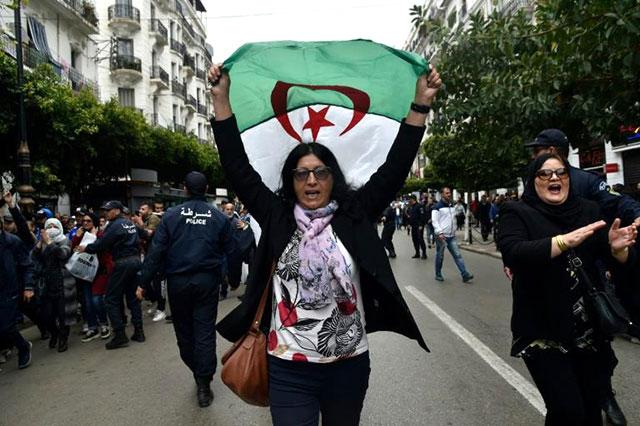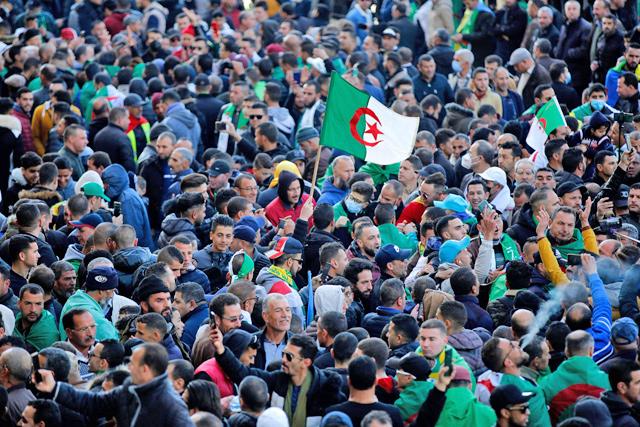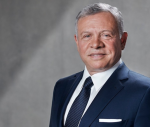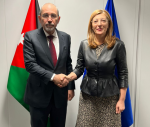You are here
Algeria anti-system protests mark first anniversary
By AFP - Feb 17,2020 - Last updated at Feb 17,2020
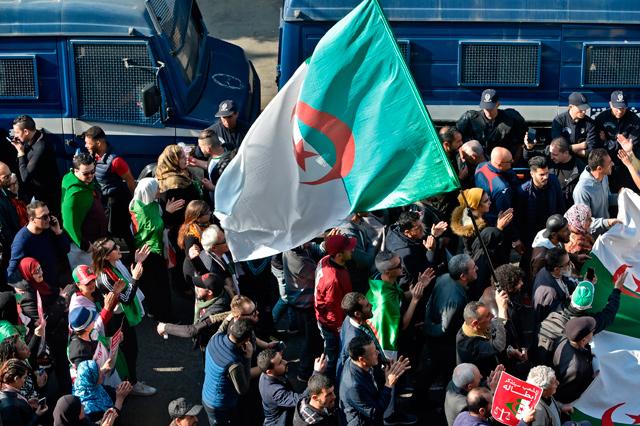
Algerians march in an anti-government demonstration in the capital Algiers on Friday (AFP photo)
ALGIERS — On February 22, 2019, sudden and unprecedented protests swept Algeria. A year on, despite bringing down a president, the "Hirak" protest movement faces mounting challenges.
Massive anti-government protests held every Friday quickly gathered momentum: Six weeks in, President Abdelaziz Bouteflika resigned after 20 years in power.
But Algeria's military was quick to reassert control and by the time presidential elections were held in December, a former Bouteflika ally succeeded him in a vote deeply opposed by protesters and shunned by most voters.
"With the presidential election, we passed into act two, with all the spectre of improbability, uncertainty and instability" that entails, Karima Direche, an historian of contemporary North Africa, told AFP.
"It matches what Algerians have been saying for a year: 'Everything is moving and nothing is changing.'"
While a year of weekly protests has not yet brought down "the system" that they challenged, the Hirak movement has profoundly changed Algeria's political landscape.
'Increased awareness'
Bouteflika's resignation and the imprisonment of corrupt businessmen and politicians are "tangible results, even if the main demand of regime change and systemic reform is far from having been achieved", said Dalia Ghanem, a researcher with the Carnegie Middle East Center in Beirut.
But Hirak's biggest success, she said, was "the increased awareness of Algerians and their desire to reconnect with politics... without fear of another civil war".
A brutal war between the Algerian army and Islamist rebels killed some 200,000 people in the 1990s.
The trauma of the conflict was exploited under Bouteflika to discourage dissent, and until February 22 had rendered large protests on the streets unimaginable.
Ahead of the first protests, Algeria's political system had remained focused on presidential polls that were widely expected to return Bouteflika to power — despite the 82-year-old being largely incapacitated since a stroke in 2013.
Cut off from the public, the regime sensed growing anger but underestimated it.
Young Algerians — disproportionately affected by massive unemployment in a country where the majority is under 30 — were fed up with being represented by a wheelchair-bound octogenarian whose rare public appearances elicited mockery online.
Simmering anger peaked when, during a meeting of the president's party, a portrait of Bouteflika was addressed by party apparatchiks in the absence of the ailing leader.
Calls to protest on February 22 began multiplying across social media.
Few expected the movement to take hold though, especially in Algiers, where since 2001 public rallies had been banned.
But then on the first Friday, overwhelmed police stood aside as tens of thousands of peaceful demonstrators poured out onto the streets.
What now?
In a country without a real opposition party or union, for the first time "the street appeared as a protest force", said Karima Direche, a historian at the French National Centre for Scientific Research.
According to Jean-Pierre Filiu, professor of Middle East studies at Sciences Po University in Paris, the Hirak has for the past year taken centre stage in "both the nation's history and public space".
And by keeping the protests peaceful, "the movement has changed the rules of the game in Algerian politics, which was previously marked by violence and a lack of transparency."
The Hirak has also shown the profound transformation of Algerian society: Led by an educated and hyper-connected youth, and in particular women, who are now determined to be heard.
Algeria's new president, Abdelmadjid Tebboune, aged 74, "will have to deal with that. He won't be able to rule like those before him", said Direche.
A year on, the protests are smaller than in spring 2019, but the movement remains strong.
The Hirak wants to influence the changes promised by the new president but is struggling to structure itself and agree on a future strategy.
"As the movement celebrates its first anniversary, I want to ask 'What's next?'," said Ghanem. "What do you want? What are you demanding and how will you obtain concrete results?"
Several civil society groups born of the Hirak movement are to hold a conference in Algiers on Sunday marking the anniversary in a bid to unify their ranks as a political force.
Participants from across Algeria and abroad will examine a "February 22 Proclamation" summing up the demands and slogans of the protest movement, organisers said.
Related Articles
TUNIS — The Algerian regime is exploiting coronavirus to defeat a protest movement that has shaken it to its core over the past year, analys
KHERRATA, Algeria — Several thousand Algerians rallied in a northern town Tuesday, almost two years since the start of the "Hirak" protests
ALGIERS — A leading Algerian opposition activist has been detained and is to appear before prosecutors on Thursday, his lawyer said, weeks


